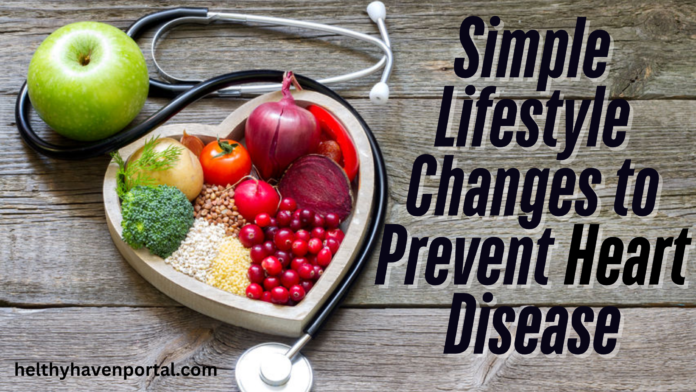Small consistent changes enable people to reduce their global death risk from heart disease despite its position as a top cause of mortality worldwide. When following the Simple Lifestyle people improve their cardiovascular health as well as the overall quality of their life. Daily decisions based on awareness help reduce the chances of developing heart disease significantly. Several efficient methods exist to develop a more balanced and uncluttered way of living.

Understanding the Power of a Simple Lifestyle
Numerous people perpetuate false perceptions about heart-healthy lifestyles by assuming such lifestyle demands intense alteration while regular changes produce superior results. A Simple Lifestyle demonstrates how to decrease stress while utilizing nourishing food options combined with physical activity and keeping optimistic mental health status.
1. Prioritize a Heart-Healthy Diet
A nutritional diet functions as an essential component to avoid the development of heart disease. Incorporate the following changes:
- Eat More Whole Foods – Fresh fruits as well as vegetables together with whole grains along with lean proteins supply the heart with all the necessary nutrients.
- Sweetener and sodium sodium together with trans fats should be kept at a minimal level when selecting processed foods.
- Healthy Fats Are Key – Include sources of omega-3 fatty acids like salmon, walnuts, and flaxseeds.
- Your heart needs sufficient water for proper operation which can be achieved through hydration.
2. Stay Physically Active
The core element of A Simple Lifestyle demands frequent physical exercise which fortifies your heart. Multiple simple activities exist for people to maintain their physical activity:
- Walk More – People should engage in daily walking sessions that last for at least thirty minutes.
- Try Low-Impact Exercises –The combination of yoga practice and swimming and cycling stands out as ideal exercises which promote heart health benefits.
- Strength Training –Participating in moderate exercises with resistance allows people to enhance their blood circulation during the process of lowering their cholesterol measurements.
3. Manage Stress Effectively
Lasting stress leads to severe damage throughout the heart structure. Here’s how to reduce it:
- Practice Mindfulness – The approach to manage stress comes through meditation alongside deep breathing and gratitude journaling practice.
- Engage in Hobbies –The combination of painting activities with reading and gardening serves as a source of relaxation for people.
- Stay Connected – Human mental health improves through the maintenance of true friendships.
4. Get Quality Sleep
Lasting stress leads to severe damage throughout the heart structure. Here’s how to reduce it:
- Maintain a Sleep Schedule – The approach to manage stress comes through meditation alongside deep breathing and gratitude journaling practice.
- Create a Relaxing Routine – The combination of painting activities with reading and gardening serves as a source of relaxation for people.
- Ensure a Comfortable Sleep Environment – Human mental health improves through the maintenance of true friendships.
5. Avoid Harmful Habits
A Simple Lifestyle requires people to eliminate all harmful behaviors because these actions threaten life quality.
- Quit Smoking – The habit of smoking leads to artery damage that elevates the possibility of heart disease development.
- Limit Alcohol Consumption –Heart health benefits from limited drinking if someone chooses to drink.
- Cut Back on Caffeine – Consuming excessive amounts of caffeine leads to cardiovascular abnormalities that trigger irregular heart functions along with elevated blood pressure maintenance.
Inspirational Simple Lifestyle Quotes
Simple Lifestyle Quotes exist to drive your path toward success:
- “Simplicity is the ultimate sophistication.” – Leonardo da Vinci
- You should streamline your lifestyle to provide others a basic and untroubled existence. – Mahatma Gandhi
- Things which truly bring happiness in life never consist of material possessions. – Art Buchwald
Embracing ‘My Simple Lifestyle’
Your journey to My Simple Lifestyle starts with small changes according to your inquiry. Climb down the clutter path while making care for yourself and self care activities your top priority while carefully planning your valuable time.
5 Ways to Live a Simple Life and Protect Your Heart
- Nutrition together with exercise work as a package to promote heart health.
- The key to counter stress involves minimalizing mental overcrowding through stress reduction while nurturing optimistic ideas.
- The practice of gratitude fosters better happiness and reduced levels of stress in individuals.
- Minimizing technology use helps build relaxation along with mind-clearing abilities.
- The benefits of nature contact include both improved heart health and fresh air exposure and outdoor activities.
How to Live a Simple Lifestyle for Long-Term Wellness
The Simple Lifestyle requires thoughtful actions instead of denying ourselves anything. Practicing health, happiness and stability leads to heart protection and a meaningful way of life. Start today, one small change at a time!
Frequently Asked Questions (FAQs)
1. How can I start living a simple lifestyle?
Begin by decluttering your space, prioritizing essential activities, and focusing on health-conscious choices.
2. What are 5 ways to live a simple life?
- Eat nutritious foods
- Exercise regularly
- Reduce stress
- Limit digital distractions
- Practice gratitude
3. How does a simple lifestyle prevent heart disease?
A Simple Lifestyle promotes healthier food choices, regular exercise, and reduced stress, all of which contribute to heart health.
4. Are there any simple lifestyle quotes for motivation?
Yes! One great quote is, “Simplicity is the ultimate sophistication.” – Leonardo da Vinci.
5. Can a simple lifestyle improve mental health too?
Absolutely! A stress-free and organized life enhances mental clarity and emotional stability, reducing anxiety and depression risks.


